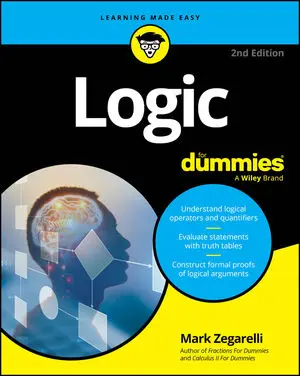Oops! Something went wrong while submitting the form.
Articles & Books From Logic
An accessible resource to help you puzzle out logic concepts Logic For Dummies, 2nd Edition explains all the varied ways we use logic in philosophy, science, and everyday life. College students taking a logic course and lifelong learners alike can benefit from this accessible guide to logic concepts—such as syllogisms, constructing proofs and refutations, propositional and predicate logic, symbolic logic, modal and fuzzy logic, deductive and inductive reasoning, and beyond.
Cheat Sheet / Updated 02-14-2022
Logic is more than a science, it’s a language, and if you’re going to use the language of logic, you need to know the grammar, which includes operators, identities, equivalences, and quantifiers for both sentential and quantifier logic. And, if you’re studying the subject, exam tips can come in handy.Sentential logic operators, input–output tables, and implication rulesWorking with sentential logic means working with a language designed to express logical arguments with precision and clarity.
Article / Updated 12-22-2021
With all the restrictions placed upon it, you may think that logic is too narrow to be of much use. But this narrowness is logic's great strength. Logic is like a laser — a tool whose best use is not illumination, but rather focus. A laser may not provide light for your home, but, like logic, its great power resides in its precision.
Article / Updated 05-11-2021
Because deduction rhymes with reduction, you can easily remember that in deduction, you start with a set of possibilities and reduce it until a smaller subset remains. For example, a murder mystery is an exercise in deduction. Typically, the detective begins with a set of possible suspects — for example, the butler, the maid, the business partner, and the widow.
Article / Updated 05-11-2021
When people say "let's be logical" about a given situation or problem, they usually mean "let's follow these steps:" Figure out what we know to be true. Spend some time thinking about it. Determine the best course of action. In logical terms, this three-step process involves building a logical argument.
Article / Updated 03-26-2016
Quantifier logic encompasses the rules of sentential logic and expands upon them so that you can write whole statements with logic symbols. Those symbols come into play when you work with identities, or interchangeable constants. The rules of identity are shown here: And, when talking about identities, you c
Article / Updated 03-26-2016
Taking an exam in logic calls for a clear head and a clear plan. The tips in the following list can help you approach a logic exam with the best chance to prove your proficiency: Start by glancing over the whole exam to get a feel for what is covered. Warm up with an easy problem first. Fill in truth tables column by column.
Article / Updated 03-26-2016
Working with sentential logic means working with a language designed to express logical arguments with precision and clarity. To make use of this language of logic, you need to know what operators to use, the input-output tables for those operators, and the implication rules. This table introduces sentential
Article / Updated 03-26-2016
In any logic system, you compare statements to prove or disprove their validity. With sentential logic, you use the following equivalence rules to make those comparisons:



